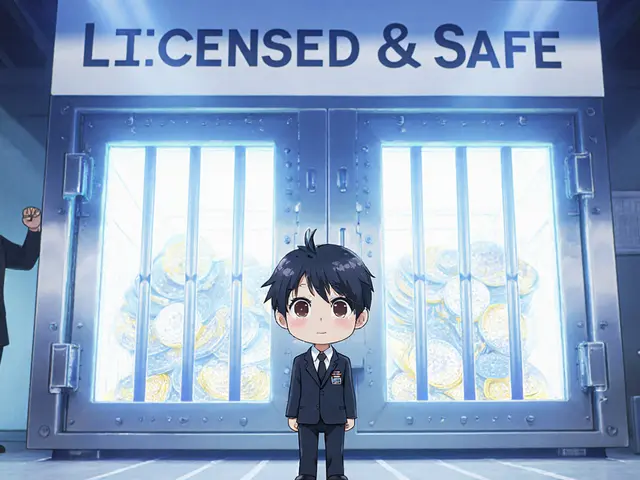If you type "DSX" into a search box today, most results will tell you the platform is dead. Yet dozens of traders still wonder what the exchange offered, why it vanished, and which alternative is safest now. This review pulls together the exchange’s origins, its core features, the security steps it claimed, the reasons behind its 2021 bankruptcy, and the best options for anyone who once used DSX.
What Was DSX?
When DSX Crypto Exchange is described as a centralized cryptocurrency exchange launched in 2014 and headquartered in London, UK, the first thing that stands out is its professional‑finance pedigree. The founding team came from London’s stock‑trading world and marketed the platform as a bridge between traditional finance and crypto markets.
Regulatory Ambitions
DSX tried to align with the UK’s tightening AML rules. By 2020 it was applying for FCA registration under the 5th Anti‑Money‑Laundering Directive (5th AMLD). The move signaled a desire to be seen as a compliant, trustworthy player, but the regulatory process never finished before the exchange filed for bankruptcy.
Core Trading Features
- Supported fiat currencies: EUR, GBP, USD, RUB.
- Deposit methods: wire transfer from day one, credit‑card deposits added in February 2019.
- Crypto‑to‑crypto and fiat‑to‑crypto pairs for 29 established tokens (e.g., Bitcoin, Ethereum, Ripple).
- Languages: English, Russian, Turkish.
- Mobile access: iOS app launched Oct 15 2019; Android version promised but never released.
The exchange deliberately avoided newer altcoins, keeping the catalog small to simplify compliance and reduce technical risk.

Security Claims
DSX promoted a three‑layer security stack:
- Two‑factor authentication (2FA) for all accounts.
- Cold‑storage of the majority of user funds, with only a limited hot‑wallet balance for withdrawals.
- Manual withdrawal processing to add a human check before funds left the platform.
While these measures look solid on paper, the later bankruptcy and user complaints about delayed withdrawals suggest the operational controls may not have been as robust as advertised.
User Experience - What Traders Said
Design-wise, DSX earned praise for a “very crisp” interface that resembled a London brokerage platform. Beginners could navigate the order book and chart screens without needing deep technical knowledge. However, the limited token list meant that users chasing the next meme coin had to maintain accounts elsewhere, adding friction to portfolio management.
Support quality was mixed. Early‑stage users reported quick replies, but as the exchange approached its financial collapse, response times stretched and some users never received a resolution to withdrawal requests.
Market Position and Performance
Because DSX never disclosed reserve data and CoinMarketCap marked its volume as “untracked,” the exchange’s true trading activity is hard to verify. Nevertheless, comparison sites placed DSX in the middle of a field of 333 platforms, noting its age (founded 2014) as a reliability point compared to newer entrants.
| Exchange | Founded | Supported Coins | Fees (taker) | Mobile App | Status |
|---|---|---|---|---|---|
| DSX | 2014 | 29 (major tokens only) | 0.20 % | iOS (Android never released) | Bankrupt (2021) |
| Coinbase | 2012 | ≈200 | 0.50 % | iOS & Android | Active, FCA‑registered |
| CEX.io | 2013 | ≈150 | 0.25 % | iOS & Android | Active, regulated in EU |

Why Did DSX Collapse?
The bankruptcy filing on 12 January 2021 marked the end of operations. While no official forensic report was published, several factors contributed:
- Insufficient capital reserves to cover user withdrawals during a market rally.
- Regulatory uncertainty - the FCA registration never materialized, leaving the exchange vulnerable to compliance penalties.
- Limited token offering reduced fee revenue compared to rivals with hundreds of pairs.
- Negative publicity after being listed on Crypto Legal UK’s “Reported Scam Companies” list in October 2025, which cemented the perception of fraud.
Users who filed complaints on platforms like Revain described “moderate transaction fees” but highlighted “long‑term inactivity” and “unresponsive support” as the biggest pain points during the wind‑down.
Where to Go Next - Recommended Alternatives
If you still hold DSX‑originated assets or simply need a reliable exchange, the industry consensus points to two main substitutes:
- Coinbase - a US‑based exchange with full FCA registration, a massive coin list, and a proven track record of handling large withdrawal spikes.
- CEX.io - offers comparable fees, a solid mobile experience, and EU‑level regulatory compliance.
Both platforms provide insurance‑type coverage for custodial assets, something DSX never advertised.
Key Takeaways
- DSX was an early‑stage, London‑based exchange that shut down in 2021 after filing for bankruptcy.
- It offered a clean UI, 2FA, and cold‑storage, but limited coin selection and no proven reserve data.
- Regulatory gaps and insufficient liquidity led to its collapse; the exchange now appears on scam watchlists.
- For former DSX users, moving to a regulated, well‑capitalized exchange like Coinbase or CEX.io is the safest path.
- The DSX story highlights the importance of checking an exchange’s reserve transparency, regulatory status, and user‑support reliability before depositing funds.
Is DSX still operating in 2025?
No. DSX filed for bankruptcy on 12 January 2021 and has been listed as a “dead” exchange by multiple tracking sites.
Can I still withdraw funds from DSX?
The platform stopped processing withdrawals after the bankruptcy. Users must have retrieved any balance before the shutdown; otherwise, recovery chances are low.
How did DSX’s security measures compare to other exchanges?
DSX offered standard 2FA, cold‑storage, and manual withdrawal checks - similar to many mid‑tier exchanges. However, the lack of transparent reserve audits made its security claims harder to verify.
What are the best alternatives for former DSX users?
Coinbase and CEX.io are the most frequently recommended swaps. Both are regulated, have larger coin rosters, and provide mobile apps for iOS and Android.
Did DSX ever get FCA registration?
No. DSX applied for FCA registration but the process was never completed before the exchange went bankrupt.







Jenna Em
October 20, 2025 AT 08:35The shadows whisper that DSX was never meant to survive.
Stephen Rees
October 20, 2025 AT 14:08When you peel back the glossy press releases you see a network of hidden hands pulling the strings; DSX was probably a testbed for larger institutions to experiment with fiat‑crypto integration before disappearing when the experiment went south.
Katheline Coleman
October 20, 2025 AT 20:31Dear community, I extend my sincere sympathies to those who suffered losses during the DSX liquidation. While the platform presented a polished interface, the lack of transparent reserve audits should have signaled caution. It is my hope that future exchanges will adopt stricter disclosure standards to protect users.
Amy Kember
October 21, 2025 AT 03:28DSX looked sleek but the token list was a joke
Evan Holmes
October 21, 2025 AT 11:48Another dead exchange, another broken promise. Nothing new here.
Isabelle Filion
October 21, 2025 AT 22:55Ah, DSX – the perfect case study in how to sound professional while delivering nothing more than a glorified fiat‑to‑crypto tunnel. One might even say it was a masterclass in mediocrity dressed up as innovation.
Ty Hoffer Houston
October 22, 2025 AT 12:48Hey folks, just wanted to point out that while DSX is gone, there are still plenty of regulated options out there that actually have solid insurance coverage. If you’re looking for something reliable, consider checking the FCA‑registered exchanges.
Jessica Pence
October 23, 2025 AT 05:28So i read this review and i think it’s important to note that not all the info is 100% accurate – some of the dates seem off and there were a few typos. But overall it gives a good picture of why DSX failed.
johnny garcia
October 24, 2025 AT 00:55From a theoretical standpoint, the DSX episode underscores the necessity of rigorous capital adequacy frameworks; without them, even a well‑presented platform cannot survive the liquidity stresses of a bull market. 📈
Andrew Smith
October 24, 2025 AT 23:08Look, DSX is a cautionary tale, but it also shows that the market rewards resilience. Keep your eyes on exchanges that actually have back‑up liquidity and you’ll come out ahead.
Ryan Comers
October 26, 2025 AT 00:08Seriously, who even cares about DSX now? It’s like reminiscing about dial‑up internet in the age of 5G. Anyway, the drama was fun while it lasted. 🎭
Joy Garcia
October 27, 2025 AT 02:55It’s tragic how many people trusted DSX, believing in its promises-only to be left in the cold. The whole saga feels like a modern‑day cautionary fable.
mike ballard
October 28, 2025 AT 09:28From a compliance perspective, DSX’s failure to secure FCA registration essentially left it operating in a regulatory gray area, which amplified risk exposure across its user base.
Elizabeth Chatwood
October 29, 2025 AT 18:48omg dsx was so messed up i cant even lol its like dont trust any exchange without proper proof
Tom Grimes
October 31, 2025 AT 06:55When we examine the DSX collapse, several interlocking factors emerge that collectively illustrate the fragility of insufficiently capitalized crypto platforms. First, the lack of transparent reserve audits meant users could not verify that the exchange held adequate liquidity to meet withdrawal demands. Second, the regulatory limbo-an incomplete FCA registration-exposed the firm to potential legal penalties and eroded user confidence. Third, the narrow token offering limited fee revenue streams, making the business model vulnerable to market fluctuations. Fourth, the manual withdrawal process, while intended as a security feature, became a bottleneck during periods of heightened market activity, resulting in delayed payouts and growing frustration. Fifth, the absence of a robust insurance fund left users without recourse when the platform failed. Sixth, the broader market downturn in early 2021 amplified liquidity stress across the industry, and DSX’s weak capital reserves could not absorb the shock. Seventh, communication breakdowns-support response times stretched, and many users never received resolutions, further damaging reputation. Eighth, the platform’s reliance on a small team with limited risk management expertise meant strategic missteps went unchecked. Ninth, the timing of the bankruptcy filing coincided with heightened scrutiny from regulators worldwide, amplifying negative press. Tenth, inclusion on fraud watchlists cemented the perception of misconduct, discouraging any potential rescue or partnership. Eleventh, investors and users alike learned that a polished UI does not compensate for underlying operational deficiencies. Twelfth, the incident underscores the importance of diversified asset custody solutions. Thirteenth, it serves as a reminder that crypto exchanges must maintain clear, auditable pathways for funds. Fourteenth, the DSX case will likely influence future regulatory frameworks focusing on transparency. Finally, the lasting lesson is that users should prioritize exchanges with proven capital adequacy, regulatory compliance, and transparent audit practices.
Paul Barnes
November 1, 2025 AT 21:48DSX is a textbook example of why transparency matters.
John Lee
November 3, 2025 AT 15:28What really tickles my brain is how DSX tried to be a bridge between old‑school finance and crypto, yet its foundation was as thin as a house of cards. If they had invested in robust liquidity pools, maybe the story would be different.
Rebecca Kurz
November 5, 2025 AT 11:55It is absolutely unfathomable that an exchange founded in 2014 could operate for so long without clear reserve disclosures!!! This is a glaring red flag that any sane investor should have heeded!!!
James Williams, III
November 7, 2025 AT 11:08Hey Rebecca, I get the paranoia, but the real takeaway is to look for platforms with third‑party audits-those give you a concrete snapshot of solvency rather than just trust.
Scott McCalman
November 9, 2025 AT 13:08Scott here – let’s be real, everyone loved DSX’s sleek UI until the money vanished. It’s a classic case of style over substance, and it should have been obvious from day one.